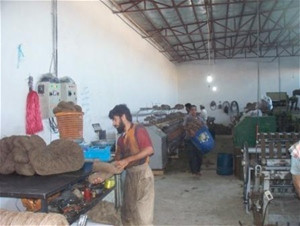
Packing wool at the Ikhlas Wool Spinning Company.
USAID/ASMED
USAID grant enables an Afghan company to produce wool thread locally, boosting the carpet industry.
10 DECEMBER 2009 | MAZARI SHARIF, AFGHANISTAN
Afghanistan’s hand-woven carpets are world famous and poised to play a significant role in the country’s economic growth. However, the wool thread used to weave the carpets is, more often than not, imported from neighboring countries. Until recently, Afghanistan lacked the wool production and storage facilities to enable the country’s carpet producers to maximize their profits by weaving with domestic wool.
The Ikhlas Wool Spinning Company in Mazari Sharif is one of the few licensed companies in Afghanistan producing wool thread for carpets and rugs. Established in 2002 as a wool trading firm, the company was, until recently, exporting raw Afghan wool to Pakistan and Iran, and importing the expensive processed thread in return. With recent assistance from USAID, it is now producing and storing thread in Afghanistan.
In May 2009, the firm opened its own processing factory and began producing thread made from local wool. The high-quality thread is sold for less than imported materials, spurring demand from local carpet producers. Afghan weavers are now able to create quality carpets at a lower cost and generate greater profits.
Lacking the storage facilities required to meet this increased demand, Ikhlas turned to USAID. Using a Value Chain Improvement Grant, the Ikhlas Company built a new facility for storing its processed wool.
Ikhlas’ products remain in high demand among local carpet weavers. The company’s production capacity has increased from 400 kilograms of wool per day to 1,350 kilograms per day. The firm now buys raw wool from producers as far away as Ghazni, Paktya, and Kandahar provinces and has expanded its workforce, recruiting another 20 employees to fill its orders.
Carpets are Afghanistan’s biggest commercial export, and the country is the third largest exporter of handmade carpets in the world. The industry provides employment for an estimated six million Afghans and generates approximately $140 million in sales annually. USAID’s support of this key link in the carpet value chain also benefits local wool and carpet producers, creating significant employment and incomes for local communities.







Comment
Make a general inquiry or suggest an improvement.